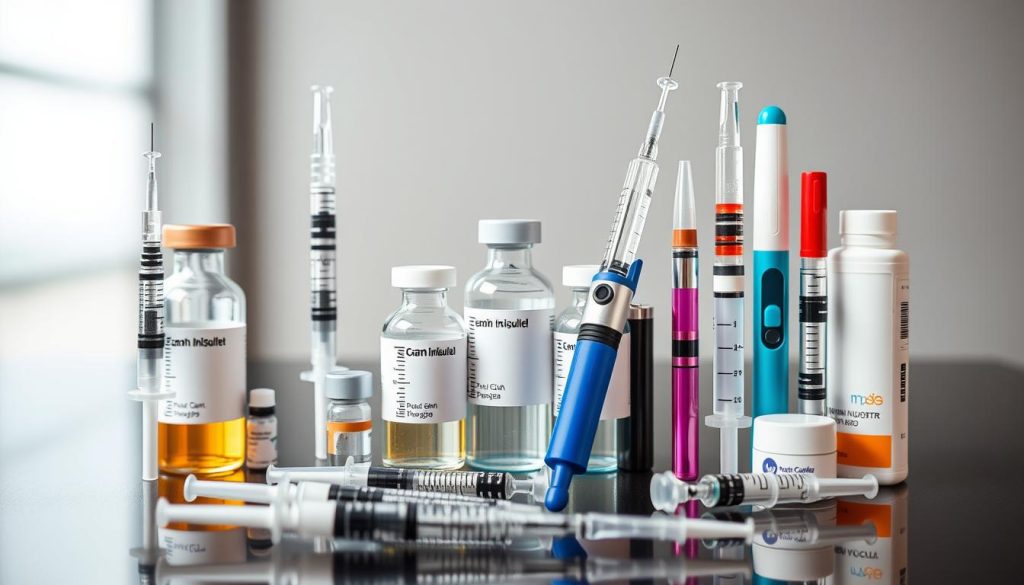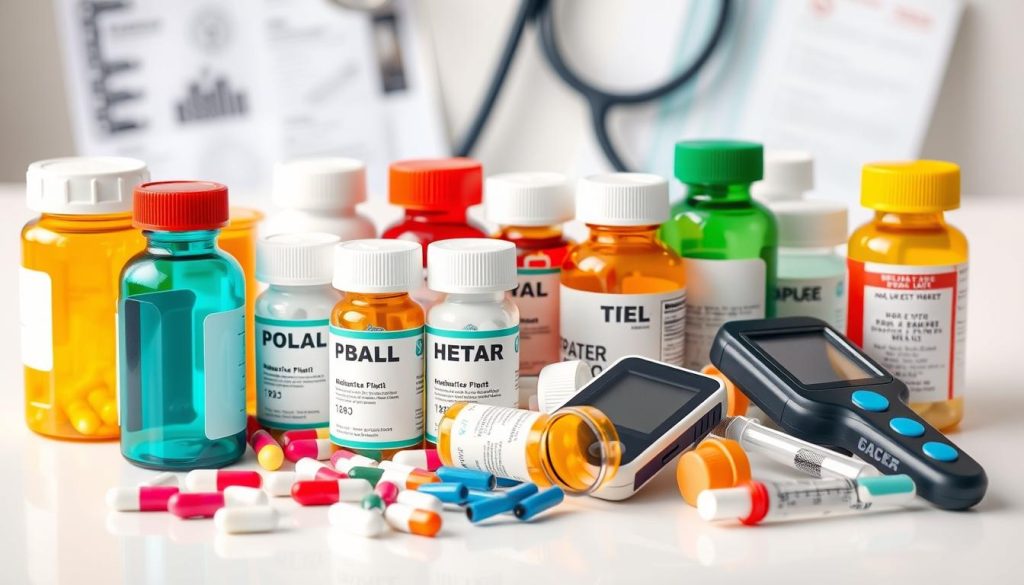Improving life for people with diabetes is a big goal. Finding the right diabetes mellitus medication is key to managing the disease. Thanks to personalized medicine, managing diabetes with medication has made great strides. This brings new hopes and better results for patients everywhere.
There are many diabetes prescription medication choices out there. It’s important to know about the safest and most effective treatments for each person. This guide will explore medication options, how to stick to them, and the importance of lifestyle changes for better diabetes mellitus care.
This information is not just about controlling the disease. It’s about giving people with diabetes and their doctors the tools to make smart health choices. Let’s explore the world of diabetes management together. Every medication has the power to make a big difference in someone’s life.
Understanding Diabetes Mellitus and Medication Necessity
Diabetes mellitus is a chronic condition that needs careful management. Medications are key in controlling it. They help keep blood sugar levels in check and prevent serious complications.
The Role of Medications in Diabetes Management
Good diabetes treatment relies on the right medications. For type 1 diabetes, insulin is vital because the body can’t make it. Type 2 diabetes patients may use different type 2 diabetes medication options based on their condition. These drugs help control blood sugar and reduce the risk of serious problems like nerve damage and heart disease.
Types of Diabetes: Type 1 vs Type 2
Type 1 and type 2 diabetes are quite different. Type 1 is an autoimmune disease where the body attacks insulin-making cells. People with type 1 diabetes need insulin shots or a pump to manage their blood sugar.
Type 2 diabetes is about insulin resistance, where cells don’t respond well to insulin. Treatment starts with lifestyle changes and oral medications. Sometimes, insulin is needed as the disease gets worse.
Goals of Treatment: Beyond Blood Sugar Control
While controlling blood sugar is key, the bigger goals are to improve quality of life and prevent complications. A complete diabetes treatment plan includes education, diet advice, exercise, and regular doctor visits. It also looks at heart health, mental health, and more to ensure overall well-being.
Overview of Oral Antidiabetic Drugs
Exploring oral antidiabetic drugs shows their key role in managing diabetes mellitus. These drugs are essential for those with Type 2 diabetes. They highlight the importance of ongoing research and understanding in improving patient care.
First-Line Therapies for Type 2 Diabetes
First-line treatments for Type 2 diabetes include well-studied oral drugs. These drugs help control blood sugar levels and prevent diabetes-related complications. Metformin, a biguanide, is a common first choice due to its effectiveness and safety.
Comparing Sulfonylureas, Biguanides, and Thiazolidinediones
Each type of oral antidiabetic drug works differently. Sulfonylureas make the pancreas produce more insulin. Biguanides, like metformin, lower liver glucose production and improve insulin sensitivity. Thiazolidinediones make muscles and fat more responsive to insulin. Choosing the right drug depends on the patient’s health and medical history.
| Drug Class | Mechanism of Action | Common Side Effects |
|---|---|---|
| Sulfonylureas | Stimulate insulin secretion from pancreatic beta cells | Hypoglycemia, weight gain |
| Biguanides | Reduce hepatic glucose production | Gastrointestinal upset |
| Thiazolidinediones | Improve peripheral insulin sensitivity | Weight gain, fluid retention |
Safety and Side Effects of Oral Medications
Oral antidiabetic drugs offer many benefits for diabetes management. Yet, each type has its own safety concerns and side effects. Managing these side effects is vital for effective treatment and preventing complications. Regular check-ups with healthcare providers are essential for maintaining health with these medications.
Insulin Therapy: Types and Administration
Insulin therapy is key for managing diabetes with medication. It’s essential for those with Type 1 diabetes and many with advanced Type 2. Knowing the different types of insulin and how to use them is vital for keeping blood sugar levels in check.
The range of diabetes prescription medication includes various insulins. Each is designed to meet specific needs and mimic the body’s natural insulin release. We’ll look at the main types of insulin used in insulin therapy and how they’re given.
- Rapid-acting insulin starts working about 15 minutes after use and lasts 2 to 4 hours. It’s best for controlling sugar after meals.
- Short-acting insulin begins working in 30 minutes and lasts 5 to 8 hours. It’s good for meal-related sugar spikes.
- Intermediate-acting insulin helps manage blood sugar for half a day or overnight. It starts working in 1 to 2 hours and lasts up to 18 hours.
- Long-acting insulin keeps insulin levels steady all day. It’s perfect for keeping blood sugar stable, with no peak, and lasts about 24 hours.
Each type of insulin is important based on an individual’s daily life, eating habits, and how their body reacts to insulin. Many people use a mix of insulins to control their blood sugar well.
How insulin is given has changed a lot, making it easier and more accurate. Now, there are syringes, insulin pens, advanced pumps, and even inhalable insulin. These options help people manage their diabetes in a way that fits their lifestyle.
In summary, insulin therapy is about picking the right type and finding the best way to use it. It’s all about matching the therapy to the person’s life, diabetes level, and doctor’s advice. Learning about these choices is key to managing diabetes well and living a good life.
Navigating Insulin Injections and Pump Therapy
For those with diabetes, using insulin therapy is key to keeping blood sugar levels in check. This part talks about picking the right insulin plan and the perks of pump therapy. It aims to help you add these to your diabetes treatment plan.
Choosing the Right Insulin Regimen
Finding the right insulin plan is vital for managing diabetes well. It depends on your lifestyle, eating habits, and blood sugar levels. Long-acting insulins cover your basic needs, while rapid-acting ones are for meals to control blood sugar spikes.
The Benefits of Continuous Subcutaneous Insulin Infusion
Continuous Subcutaneous Insulin Infusion (CSII), or insulin pump therapy, mimics how our bodies naturally release insulin. It lets users keep their blood sugar stable without daily injections.
Insulin pumps give a steady flow of insulin all day and night. You can also get extra doses at meals to handle blood sugar increases. This makes managing your blood sugar easier and more flexible.
| Method | Advantages | Considerations |
|---|---|---|
| Multiple Daily Injections | Flexibility in dosing; potentially less expensive | Requires more planning and tracking |
| Insulin Pump Therapy | Streamlined blood sugar management; reduces the number of needle pokes | Higher initial cost; requires training |
Choosing between daily injections or an insulin pump depends on your needs. The main goal is to control blood sugar and enhance your life. Talking to a healthcare provider can help create a diabetes treatment plan that fits you best.
The Importance of Adherence to Diabetic Medications
For those with diabetes, consistent adherence to diabetes mellitus medication is key. It helps keep blood sugar levels stable. This also lowers the chance of serious health problems.

Many things can affect how well someone sticks to their medication. These include how hard it is to follow the schedule, any side effects, and their lifestyle. It’s important to understand and tackle these challenges to manage diabetes with medication effectively.
- Education on medication benefits and proper usage: Knowing about their meds helps patients follow their prescriptions better.
- Regular consultations: Regular doctor visits help adjust meds and remind patients of the need to stick to their treatment.
- Support systems: Having emotional and practical support from loved ones and doctors is vital in keeping patients on track.
Using these methods can greatly improve diabetes management and outcomes. It shows how important diabetes prescription medication is in caring for diabetes fully.
Breakthroughs in Diabetic Medication Research
The world of diabetes treatment is always getting better. New discoveries in diabetes medication are making a big difference. These advancements offer better control over blood sugar and make managing diabetes easier for patients.
Emerging Drugs and Treatment Modalities
Scientists are working hard to find better ways to treat diabetes. They’ve found some promising new medicines that are being tested in clinical trials. These new treatments aim to tackle different problems in diabetes, like insulin resistance and how the liver makes glucose.
The Potential of GLP-1 Receptor Agonists
GLP-1 receptor agonists are a big deal in diabetes treatment. They help the body naturally lower blood sugar by boosting insulin production. They also help reduce hunger and food intake. This makes them a great option for people with type 2 diabetes, as an alternative to insulin therapy.
Diabetes Mellitus Medication and Lifestyle Modifications
Managing diabetes well needs a mix of medicine and lifestyle changes. Adding healthy habits to your routine can make your medicine work better. This helps control blood sugar and improves your health.
Changing your lifestyle is key to managing diabetes. Eating right, staying active, and making healthy habits are important. They help your diabetes mellitus medication work better, keeping your blood sugar control in check.
- Diet adjustments focusing on balanced meals with controlled carbohydrate intake.
- Regular physical activity tailored to individual ability and medical advice.
- Consistent monitoring of blood glucose levels to assess and adjust medications effectively.
It’s also important to learn about managing diabetes with medicine. Knowing how food and activities affect your blood sugar is key. This way, you can adjust your medicine as needed.
Combining medicine with lifestyle changes can greatly improve your health. This approach helps keep blood sugar levels stable. It also lowers the risk of diabetes complications.
Strategies for Managing Diabetes with Medication
Managing diabetes with medication needs a full plan. This includes changing your medication as needed and making lifestyle changes. It’s key to keep your health good and avoid diabetes problems.
Adjusting Medications: When to Consult Your Doctor
If you’re taking diabetes treatment, see your doctor often. They’ll check if your meds are working right. Changes in weight, diet, or blood sugar might mean you need new meds. Diabetes care should change as your health does.
Importance of Diet and Exercise in Medication Efficacy
Using meds with a healthy diet and exercise makes them work better. This whole approach helps control diabetes and boosts your health. Exercise and a balanced diet can also cut down on medication and slow disease growth.
Managing diabetes with meds is about finding the right balance. It’s about the right meds, a good diet, and exercise. Each part is important for keeping blood sugar stable and reaching health goals.
Diabetes Medication Compliance and Monitoring
Managing diabetes is more than picking the right diabetes mellitus medication. It’s about careful blood sugar control and tracking to see if the treatment works. Taking your meds as directed and getting regular check-ups are key to controlling diabetes well.
Tracking Blood Glucose Levels at Home
Managing diabetes starts with home monitoring. Keeping an eye on blood sugar levels helps you make smart choices about food, exercise, and diabetic medications list. This way, you can avoid serious problems like nerve damage, eye issues, and heart disease.
Understanding A1C and Regular Screening
The A1C test shows your blood sugar levels over the last 3 months. It gives a big picture of how well your diabetes plan is working. Getting this test often is important for adjusting diabetes mellitus medication to keep you healthy. It helps doctors and patients make the right changes to manage diabetes better.
- Immediate feedback on daily blood glucose levels
- Insights into the effectiveness of current diabetic regimes
- Early detection of possible health problems, leading to quick medical action
Keeping your diabetic medications list up to date and sticking to your meds is vital. Regular talks with your healthcare team also play a big role in managing diabetes. Remember, managing diabetes is a team effort between you and your healthcare team.
Aiding Blood Sugar Control with Non-Insulin Injections
For people with diabetes, non-insulin injections are now a good choice. They help keep blood sugar levels stable. These include GLP-1 receptor agonists and amylin analogs. They offer more type 2 diabetes medication options for managing the condition.
GLP-1 receptor agonists are very helpful. They help control blood sugar and can even help with weight loss and heart health. The use of Ozempic for weight loss shows how these medicines can help in more ways than one.
| Medication Type | Mechanism of Action | Health Benefits |
|---|---|---|
| GLP-1 Receptor Agonists | Mimics glucagon-like peptide-1, enhances insulin secretion | Improves glycemic control, aids weight loss, reduces heart risk |
| Amylin Analogs | Regulates blood sugar by slowing gastric emptying | Regulates postprandial glucose levels |
These diabetes mellitus medication options are a good choice for managing diabetes. They are great for those who can’t or don’t want to use insulin. It’s important to talk to your doctor about these options to find what works best for you.

Personalizing Diabetes Treatment: Case Studies
In diabetes care, making treatment plans personal is key. We look at how tailored strategies help manage diabetes. Real-life examples show how personalized treatment works for different patients.
Success Stories in Diabetes Management
Managing diabetes is tough, but many succeed with the right approach. One person controlled Type 2 diabetes with metformin and lifestyle changes. Their story shows how important it is to tailor treatment to each person’s needs.
Challenges and How They Were Overcome
Personalized care faces many challenges, like side effects and emotional strain. A patient had trouble with a new insulin plan at first. But with help and support, they learned to manage it well.
These stories show how important customization is in diabetes treatment. Tailoring medication and support to each person’s needs improves their life. They prove the strength of people with diabetes and the dedication of their healthcare teams.
Diabetes Prescription Medication and Insurance Coverage
Finding diabetes prescription medication can be tough, thanks to insurance rules. It’s key to know which meds are covered and what you’ll pay out-of-pocket. This helps control diabetes mellitus medication costs.
Insurance plans differ in what they cover for diabetes meds. Some plans offer many options from the diabetic medications list. Others only cover generics unless your doctor prescribes a specific brand. Here’s how to make the most of your insurance.
- Review Your Health Plan: Know the details of your insurance, like deductibles, copays, and coinsurance for meds.
- Consult Your Healthcare Provider: Talk to your doctor or diabetes educator about your needs. Make sure they know your insurance’s covered meds.
- Pre-authorization Requirements: Some expensive meds need pre-authorization. Knowing this can save you time and avoid delays.
- Alternative Options: If a med isn’t covered, ask your doctor about cheaper alternatives under your plan.
By considering these points, you can better manage diabetes mellitus medication costs. This ensures you keep your diabetes under control.
Common Concerns When Starting New Diabetes Medications
Starting new diabetes treatment can raise many questions. People often worry about how it will affect their blood sugar levels. They also fear the side effects of the medication. Knowing about these concerns can make the transition easier and help stick to the treatment plan.
Dealing with Hypoglycemia Risks
Hypoglycemia, or low blood sugar, is a big worry when starting new meds. It’s important to know the signs like shakiness, confusion, and sweating. Keeping an eye on your blood sugar and having quick glucose sources can help manage this risk.
Recognizing Allergic Reactions and How to Respond
Allergic reactions to diabetes meds are rare but serious. Signs like hives, trouble breathing, or swelling need quick medical help. Always talk to your doctor before starting a new medication and tell them about any unusual reactions right away.
| Concern | Description | Immediate Actions |
|---|---|---|
| Hypoglycemia | Low blood sugar levels potentially triggering shakiness, confusion. | Monitor glucose regularly, keep fast-acting sugars accessible. |
| Allergic Reactions | Responses may include hives or swelling, indicating an allergy to the medication. | Seek immediate medical help; report symptoms to a doctor. |
Expanding the Diabetic Medications List: Innovations and Generics
The world of diabetes treatments is changing fast. New drugs and generic options are being added all the time. This change helps make treatments better and more affordable for everyone.
The Rise of Generic Diabetes Medications
Generic drugs are key in managing diabetes. They are cheaper but just as good as brand-name drugs. They become available when the brand’s patent runs out.
Future Medications and Their Impact
New treatments for diabetes are on the horizon. They aim to control blood sugar better and have fewer side effects. These new options could change how we fight diabetes.
| Medication Type | Current Leading Brands | Generic Availability | Expected Innovations |
|---|---|---|---|
| Insulin | Lantus, NovoLog | Available | Ultra-fast acting formulations |
| GLP-1 Agonists | Trulicity, Victoza | Limited | Oral formulations |
| SGLT2 Inhibitors | Jardiance, Invokana | Expected | Improved cardiovascular outcomes |
| DPP-4 Inhibitors | Januvia, Onglyza | Available | Combination pills with other antidiabetics |
As more treatments are added, it’s important for doctors and patients to keep up. This way, they can make the best treatment plans possible.
Type 2 Diabetes Medication Options and Efficacy
The world of type 2 diabetes medication is vast. It offers many choices for patients and doctors. These include well-known oral drugs and new prescription options to control blood sugar and prevent complications. Choosing the right medication is key, as it depends on the person’s health, lifestyle, and goals.
Metformin is a top choice for treating type 2 diabetes. It’s effective, safe, and good for the heart. Other drugs like SGLT2 inhibitors and DPP-4 inhibitors work in different ways to lower blood sugar. The right choice depends on how well the patient can tolerate the drug, their health, and what they can afford.
New research is bringing exciting changes to diabetes care. Scientists are working on better drugs and ways to deliver them. The aim is to make treatments more effective and easier for patients to stick to. Personalized care that changes with the patient’s needs is at the heart of managing diabetes well.
FAQ
Q: What are the common medications prescribed for managing diabetes mellitus?
A: Common diabetes meds include oral drugs like metformin and sulfonylureas. Thiazolidinediones and insulin therapy are also used. The choice depends on whether you have Type 1 or Type 2 diabetes.
Q: How does medication help in diabetes management?
A: Diabetes meds help keep blood sugar levels in check. They reduce the risk of complications and improve life quality. Insulin replaces what the body lacks. Other meds help the body use insulin better or lower sugar production.
Q: What are the differences between Type 1 and Type 2 diabetes medications?
A: Type 1 diabetes is treated mainly with insulin because the body can’t make it. Type 2 diabetes often starts with oral meds, but some may need insulin too.
Q: What should I know about the different types of insulin?
A: Insulin types vary in how fast they work and how long they last. Your doctor will pick the best one for you based on your needs.
Q: How do I choose the right insulin regimen for me?
A: Choosing the right insulin depends on your lifestyle, diet, and blood sugar patterns. Work closely with your doctor to find the best plan for you.
Q: Why is adherence to diabetes medication so important?
A: Taking your meds as directed is key to controlling blood sugar. It prevents diabetes from getting worse and lowers the risk of complications. Consistent use improves your long-term health.
Q: What are the latest breakthroughs in diabetic medication research?
A: New meds like GLP-1 receptor agonists and SGLT2 inhibitors are promising. They help control blood sugar better and make managing diabetes easier.
Q: How do lifestyle modifications complement diabetes medication?
A: Healthy eating and regular exercise boost the effect of meds. They help manage blood sugar and may reduce the need for medication over time.
Q: When should I consult my doctor about adjusting medications?
A: Talk to your doctor if your blood sugar levels change, if you have side effects, or if your health or lifestyle changes. These can affect how well your meds work.
Q: How important is diet and exercise in diabetes medication efficacy?
A: Diet and exercise are very important. They affect blood sugar levels and how well your body responds to meds. A balanced diet and regular exercise can improve how well your meds work and your overall health.
Q: What are non-insulin injections, and when are they used?
A: Non-insulin injections, like GLP-1 receptor agonists, are for Type 2 diabetes. They help lower blood sugar after meals and may help with weight loss too.
Q: Can you provide real-world success cases of diabetes management?
A: While we can’t share specific cases, many people have managed their diabetes well. They used a mix of meds, lifestyle changes, and monitoring. You can find these stories in patient education materials and reputable diabetes organizations.
Q: How does insurance coverage affect access to diabetes prescription medication?
A: Insurance plays a big role in getting diabetes meds. Different plans cover different meds at different levels. It’s important to know what your plan covers to get the meds you need affordably.
Q: What are some common concerns when starting new diabetes medications?
A: Starting new meds can make you worry about low blood sugar, side effects, and allergic reactions. Talk to your doctor about these concerns and learn how to handle them.
Q: Are there generic options for diabetes medications, and are they effective?
A: Yes, there are generic versions of many diabetes meds that work just as well as the brand-name ones. They can be a more affordable option for managing diabetes.
Q: How do I know if my Type 2 diabetes medication is effective?
A: Check if your meds are working by monitoring your blood sugar and getting A1C tests. These tests show your average blood sugar levels over a few months. Also, see how well your symptoms are managed with your doctor’s help.


















